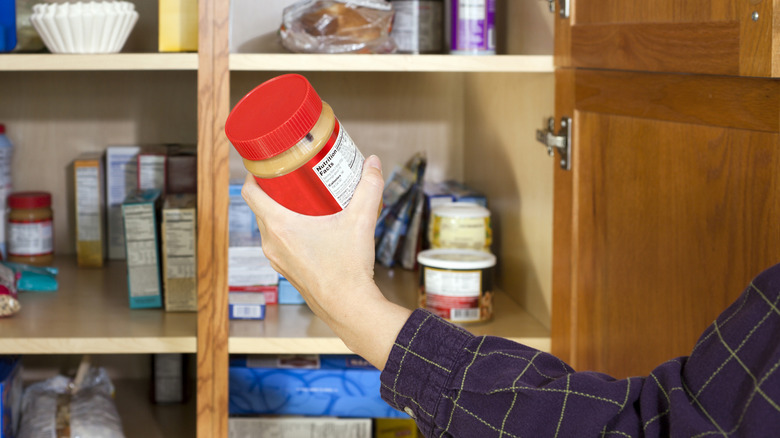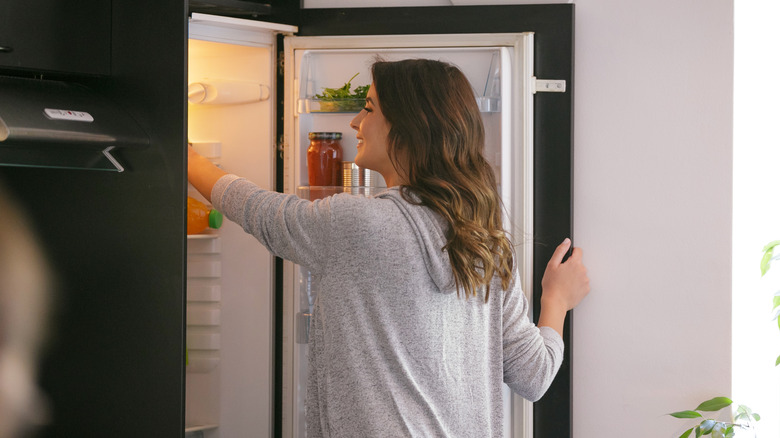Why You Should Think Twice Before Storing Peanut Butter In Your Pantry
Everything has its place in the kitchen. Milk goes in the fridge, avocados in the fruit bowl, and peanut butter takes its rightful place in the pantry. Simple as that, right? Depending on what kind of peanut butter lover you are, you may need to rethink where you're housing that jar of creamy goodness — especially if you're buying natural peanut butter.
Sometimes referred to as "old fashioned" peanut butter, natural peanut butter differs from commercial peanut butter because it doesn't undergo nearly as much processing. Instead of hydrogenated vegetable oil, natural peanut butter contains only ground roasted peanuts and maybe less than 1% salt, according to a 2016 study published in the Journal of Food Science and Technology. Many consumers find this lack of additives appealing, while also being drawn to natural peanut butter's flavor and texture. So much so that one early study from 1985 found that 59% of participants voted in favor of natural peanut butter in a test of taste and smell. So where should consumers store their beloved jar of natural peanut butter?
Pantry or refrigerator: What's best for natural peanut butter?
According to the 2016 study, researchers found that storage temperature had the greatest impact on the quality of natural peanut butter compared to alternate factors, such as grinding time, peanut variety, and more. Knowing this, is it perhaps better to store natural peanut butter in the fridge over the pantry?
Answers may vary depending on who you ask. If you're eating peanut butter on a daily basis, and it only takes a few weeks or less before that jar is empty, there's no harm in keeping it in the pantry, according to Food Network. HuffPost, on the other hand, reports that natural peanut butter can safely remain in the pantry for a month or more. The general consensus, however, is that if you take your sweet time finishing off a jar of natural peanut butter (like, say, several months), you're better off shoving it in the fridge once you've opened it. The reason is that those oils that sit towards the top of the jar can turn rancid if peanut butter isn't stored in a cool, dry location. If it's the thick of summer and your home is particularly hot or muggy, these oils may go rancid sooner rather than later. Before storing natural peanut butter in the fridge, give it a quick stir and it can stick around for as long as six months.
Where should you store commercial peanut butter?
Processed commercial peanut butter is a bit of a different story. Because these products contain additives, they're made to keep for some time, and it's no big deal to store them in the pantry. Just like natural peanut butter, however, there may come a time when that jar of peanut butter should be transferred to the fridge. According to Food Network, commercial peanut butter can hang around in the pantry for about two to three months after opening. Any time beyond that, however, should be spent in the fridge, which will give you about three to four more months with that jar.
If you have yet to pop the top on a jar of commercial peanut butter, feel free to leave it in the pantry for approximately six to nine months — that is, unless your peanut butter's expiration date tells you to throw it out sooner. Whether you're a fan of "old fashioned" peanut butter or commercial peanut butter, always err on the side of caution and discard the jar if it develops a funky look or smell. Interested in learning more about peanut butter options? Check out our top 14 picks for the healthiest brands of peanut butter.



